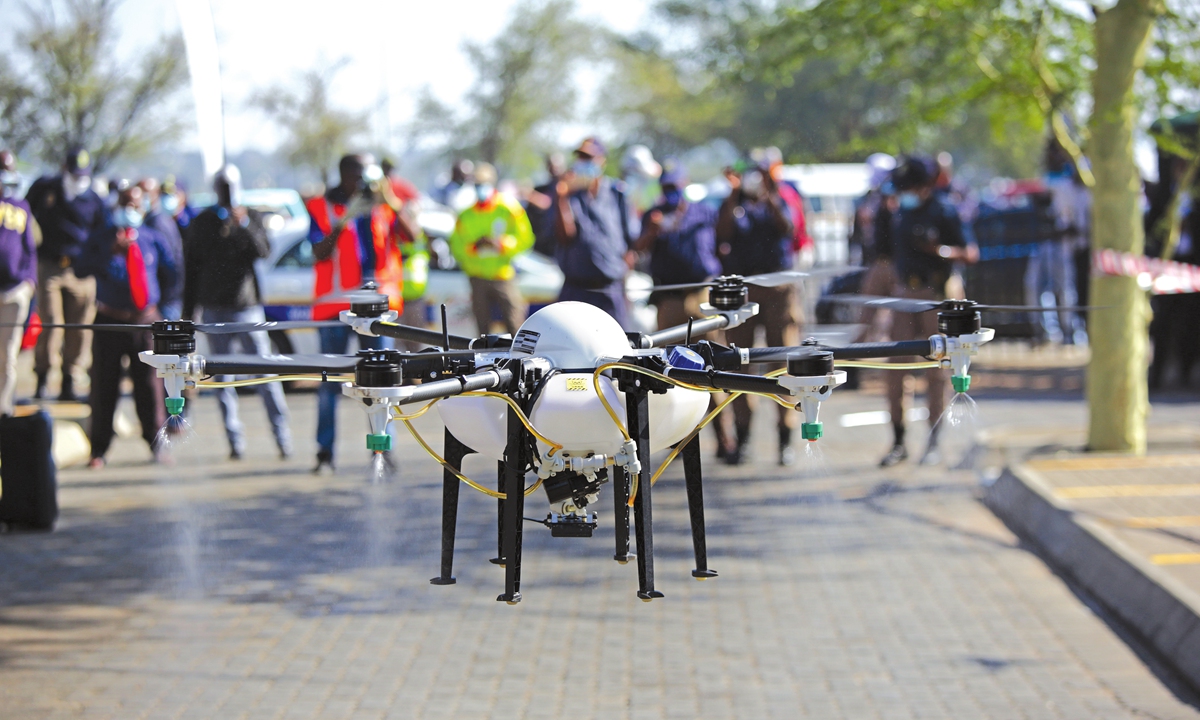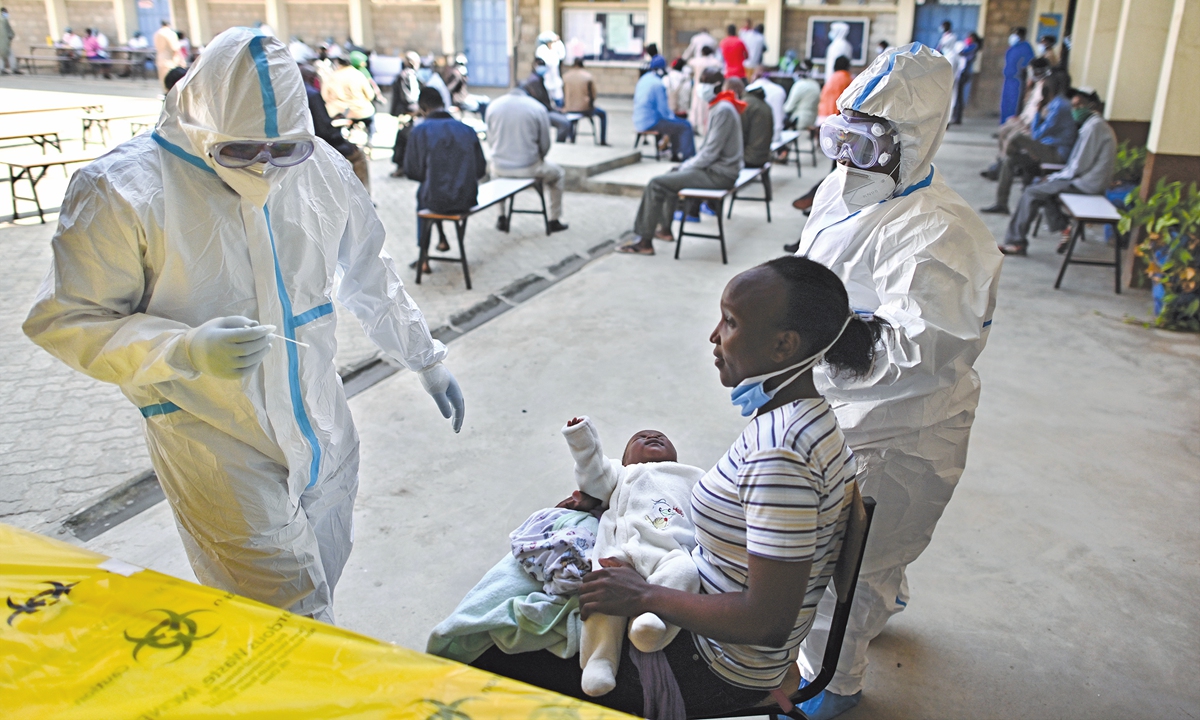With drones and masks, African innovators keep COVID-19-hit economies afloat
Source: Reuters Published: 2020/7/8 17:08:41

Tshwane Metro Police use their mobile phones to record an Agricultural Hexacopter Drone fitted with disinfectant sprays during a demonstration at Mabopane taxi rank in Pretoria, South Africa on May 12. Photos: AFP
Ghanaian pilot Eric Acquah started a drone company in 2017 to spray crops with pesticides, but when coronavirus hit the West African country he found a new mission - saving lives.
The company has used 20 drones to disinfect about 38 open-air markets in Ghana, spraying a couple of acres in minutes, a job that would take a dozen people several hours, and there are now also plans to use them to disinfect classrooms, said Acquah.
"We targeted the market areas because in Africa they are open-air and always overpopulated. So we thought if the virus is going to spread fast it will be from them," said Acquah, who was paid by Ghanaian authorities to spray the markets.
"Just closing the borders and quarantining the whole country wouldn't make sense unless there is a mass disinfection of places where people gather in larger numbers," said the founder of AcquahMeyer Drone Tech.
The markets have since reopened, with everyone wearing masks and social distancing, and traders and buyers said they felt safer, said Acquah, who is lobbying private donors for funds to disinfect other public areas - at about $15 per acre.
Acquah is just one of a host of African innovators helping poor households adapt to and survive the pandemic which has so far infected more than 416,000 people in Africa with more than 11,300 deaths, according to a Reuters tally.
As job losses mount and incomes plunge due to coronavirus lockdowns and border closures, many African countries risk spikes in poverty and hunger, food experts have warned.
Useful innovation
In Benin, a dozen entrepreneurs are developing ideas to tackle the coronavirus pandemic, from masks to 3D-printed protective gear, with financial and technical support from a government-United Nations taskforce launched in April.
"Because it hasn't been easy to import goods into the country, we have to take a hard look at what we can produce locally," said Claude Bona, head of Seme City, the government's innovation and entrepreneurship center, coleading the project.
"I think people are slowly taking measure of what's happening here in Africa with innovation, and how it can be a very powerful tool."
Atingan is one start-up, which received backing from the taskforce to adapt to the crisis, switching from making eco-friendly stoves to handwashing stations operated by pedals so users do not have to touch anything.
They have sold more than 600 units for about $100 each to clients that include the United Nations, said Franck Zanhoundaho, who founded the company with his brother.
"All of the artisans, all the welders in the country have started to make them," he said, adding that the simple medal frame is easily replicable, and that they have shared the design to encourage wider production.
The production of handwashing stations has enabled the small company to survive the crisis, he added.
The Alodo Initiative - a group of fashion designers - is another project receiving support from the taskforce to rapidly scale up its work, both to bolster the fight against COVID-19 and minimize its negative economic impact.
It is producing masks from locally available fabrics, which were tested in a lab to ensure their effectiveness in preventing coronavirus transmission. They have sold millions, some of which the government bought to distribute in schools.
"The textile sector often takes a hit when there is an economic crisis. And it's a sector that employs a lot of workers," said Charlemagne Amoussou, president of the Association of Fashion Designers of Benin.
"This local production breathed life into the textile sector in Benin, and I think that almost all the tailors, all the designers had work."

A woman and her infant wait to be tested at a mass testing site for coronavirus in Ruaraka, a densely populated suburb in Nairobi, Kenya on May 28.
Digital networks
With coronavirus cases still rising in Africa, digital networks have proven crucial in keeping economic activity going.
As disease-wary customers shun open-air markets, food sellers using Facebook, Twitter and WhatsApp have seen a surge in demand, said Rumbidzai Mbambo, 27, founder of Quickfresh, one of the newest Zimbabwean online grocery start-ups.
Mbambo set up the company in April after seeing that a government-imposed lockdown had left smallholder farmers stranded with fresh produce while people stuck at home could not buy food.
"The pandemic has redefined our way of life and our business model suits the low-touch new [environment]," she said, adding that the business has attracted more than 60 clients in its first two months.
Paida Moyo ventured into farming herbs just a few months earlier and feared she would have to bin her produce. But linking up with QuickFresh has saved her business.
"We did not lose anything and we're not in debt," said the 24-year-old, who is expanding to grow tomatoes and cabbages.
"I was a bit worried but not for long when QuickFresh came into the picture. They rescued us."
In Kenya, charities are boosting economies in poor communities by using a blockchain-backed currency to provide slum-dwellers with emergency aid on their mobile phones which they can spend on goods and services.
Grace Hellen, a 53-year-old tailor in Nairobi's Mukuru informal settlement, saw her monthly income plunge when the virus struck in March as customers stopped coming to her shop.
The 620 Sarafu ($6) a week she receives supplements the small stipend of $19 she earns as a volunteer community healthcare worker, and enables her to buy essentials like kerosene for cooking and beans.
"Life would be more difficult without this, not only for me but the community as a whole because many people are going through the same challenges," said the mother-of-five.
Newspaper headline: Smart survival
Posted in: AFRICA